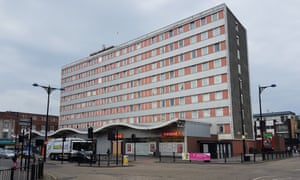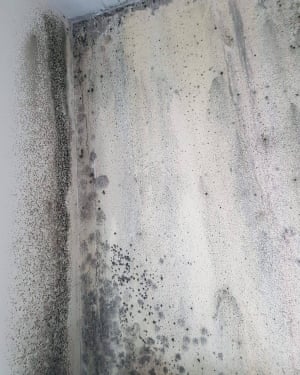Shabana winces as she points out blooms of potentially toxic black spores in the flat she shares with her husband and four children in a former office block in east London.
“Everything smells of mould and damp. It goes down our noses and mouths,” she says. “My son has asthma now and I’ve developed osteoarthritis.” It gets so cold in the winter the family has to spend £100 a week on prepaid cards to power the flat’s tiny electric heaters. “It is horrible. It was meant to be temporary but we’ve been here four years,” she says.
This is the grim reality for thousands of homeless families living in nightly paid temporary accommodation across the country. The number of people being housed in this way has grown by 500% since 2009, with English councils currently paying by the night for a quarter of the 78,930 families in temporary housing.
Letting agents and landlords have moved into this lucrative market because they can make between £100 and £300 a month extra on each home in their portfolio let on a nightly basis compared to a longer-term lease arrangement.
Now the names of those turning the biggest profit have been uncovered for the first time by the Observer, using figures obtained under Freedom of Information laws. One hundred and fifty-nine providers are making almost £160m a year from nightly paid accommodation in the 50 worst homelessness hotspots in England.
Shabana’s flat is in Donald Hunter House in the London borough of Newham. The eight-storey block was, until April, managed by major care and housing outsourcing firm Mears, which is one of the top 10 firms that together make £60m a year from nightly paid accommodation. The building is now managed by another significant player in the nightly paid market, Theori Property Management Ltd.
Q&A How many families are in temporary accommodation?
120,510
children with their families who live in temporary accommodation across England, a figure that has risen 75% since 2010.
£845m
of public money was handed to the providers of temporary accommodation in 2015. Spending on temporary accommodation has increased by 39% since 2010.
500%
rise in the number of families in nightly-paid self-contained accommodation, with councils
now paying by the night for quarter of all households living in temporary homes.
22,150
families placed outside their local area by councils last year – these out-of-area placements have almost tripled since 2010.
Mears and Theori have been charging councils, including Newham and Tower Hamlets, up to £70 a night for each of the 83 flats in Donald Hunter House. Mears, through its residential letting arm Omega, received £5.4m in the previous financial year renting properties by the night to councils including Newham, Tower Hamlets and Croydon. Theori received £3.5m for nightly paid accommodation from councils including Croydon and Islington in the same period.
Many of the families in the former BT office block – which is currently owned by an offshore company, Stratos Holdings Ltd – complain about cold, damp and mould, with walls in bedrooms, kitchens and bathrooms speckled by black mould. Some flats are infested with cockroaches and mice, while others are so overcrowded that children were sleeping with their parents, and teenagers are sharing the same rooms.
The families are also frightened of fires as the block is clad in a hazardous type of aluminium composite material (ACM). In August, the London Fire Brigade served Mears with a fire safety enforcement notice after the inspectors visited tower blocks in London clad in ACM, following the Grenfell Tower fire.
The inspectors found Mears had endangered residents by failing to provide adequate emergency escape routes or to properly maintain Donald Hunter House. The notice was supposed to be complied with in September but Mears requested an extension to January.
Yasmin, who has been living with her husband and five children in a four-bedroom flat in Donald Hunter House for three years, says she didn’t hear the building’s fire alarms when the Iceland store below caught fire in December. “We weren’t woken up by the alarm. My neighbour was awake watching TV. She had to come and knock for us,” she says.
Yasmin, who became homeless when her landlord decided to sell the family’s rented home, says she was spending £20 a day on prepaid electricity cards in the winter. “It is so expensive and the house doesn’t even get warm,” she says. “We sit in the library because it is so cold.”
The caretakers frequently run out of the cards. “Sometime they say to us ‘it is bank holiday there is nothing we can do; the office is closed’. There are people sitting here without electricity for a whole weekend,” she says.

Taxi driver Nazmu Miah, who has been stuck in a cockroach and mice infested flat with his wife and three children for four years, said he was frightened of the building burning down. “I worry about my family when I’m working. I call my wife four or five times a night to check. I tell them to turn everything off,” he says.
On the 7th floor, Shamim, a 60-year-old grandmother who was placed in the block by Newham in August, has been spending £70 a week on the pre-paid cards. “It is too cold. I’m wearing three jumpers and a fleece. When you’re asthmatic and you’ve got rheumatoid arthritis then you can’t really put up with it,” she says.
Newham council currently pays by the night for 57 households in Donald Hunter House, including 46 with children. Tower Hamlets pays for 24 households by the night in the block. Tower Hamlets paid Mears a total of £909,938 in the previous financial year for the tower.
Jane Williams, who runs the Magpie Project, a nearby drop-in service for mothers in temporary accommodation, says Donald Hunter House is unsuitable for families. “The atmosphere is oppressive and frightening,” she said. “Anyone can get in because the door is often broken. There is graffiti on the walls and anti-social behaviour in the corridors.”
Mark Meehan, chair of London Councils’ housing needs and homelessness working group, which represents boroughs across the capital, blamed rising homelessness and a shortage of rental properties for the explosion in nightly paid accommodation. “We would like to get out of this market but councils are in an extremely difficult position,” he says.

He adds that London councils had agreed nightly paid rates to stop prices spiralling out of control in bidding wars between desperate boroughs. “Providers are making a substantial amount of money. But we are trying to bring the cost down and move away from nightly paid accommodation,” he says.
Karen Buck, the Labour MP for Westminster North, whose bill to ensure homes are fit for human habitation has received government backing, says some landlords and agents were exploiting the housing crisis by charging councils by the night for temporary housing. “The result is expensive, insecure, frequently poor-quality properties for some of our most vulnerable people, costing the taxpayer millions,” she says.
Mears said the vast majority of its business was securing long-term good-quality homes. “We only provide nightly lets where required by the local authority and when it is the only alternative to B&B.”
The firm said it was confident that it had acted in a fully responsible way in all matters. “We ensure that the council approves all accommodation as fit for purpose, as was the case here. We complied with government requirements to have the cladding tested. With agreement from, and under guidance by, the council and London Fire Brigade, we introduced a fire management plan for resident safety, including the recruitment of fire wardens to patrol the building,” said a spokesperson.
Theori said in a statement: “Theori have only just taken over management of the building and are looking into these claims and will provide an update.”
Newham said that it was confident fire safety measures were now in place. It said it had raised the heating problems with the managing agent. “They have confirmed that heating provision throughout the block will be replaced later this year ahead of the winter months. Pest control services are contracted to carry out quarterly inspections of the building and deal with any issues,” said the spokesperson.
Tower Hamlets council said it had not received any block-wide complaints about mould, cockroaches or other poor housing conditions.